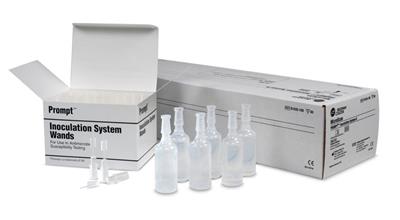Specifications:
| Application | Microbiology |
| Storage Temperature | 2-8°C |
| Product Brand | Beckman Coulter |
| Product Grade | Microbiology grade |
Beckman Coulter MicroScan™ reagents are designed to support microbial identification (ID) and antimicrobial susceptibility testing (AST) within clinical microbiology laboratories. These reagents are optimized for use with MicroScan automated and conventional panels, ensuring accurate, efficient, and standardized bacterial and yeast identification.
Detailed Description of Beckman Coulter MicroScan™ Reagents
| Ref. Code | Reagent Name | Description & Application |
|---|---|---|
| B1010-40 | MicroScan™ Mineral Oil (60mL) | Used as an overlay for anaerobic reactions in biochemical identification panels, preventing evaporation and oxidation of metabolic substrates. |
| B1010-41A | MicroScan™ Kovac's Reagent (30mL) | Used in the Indole test, a key biochemical test for differentiating Enterobacterales by detecting tryptophan degradation into indole. |
| B1010-42A | MicroScan™ Alpha Naphthol (1.5g) | Component of the Voges-Proskauer (VP) test, used to detect acetoin production, an important test in differentiating Enterobacter, Klebsiella, and Serratia spp. |
| B1010-43A | MicroScan™ 40% Potassium Hydroxide (KOH) (30mL) | Used for the KOH string test, helping to differentiate Gram-negative from Gram-positive bacteria based on cell wall integrity. |
| B1010-44A | MicroScan™ 0.8% Sulfanilic Acid Reagent (30mL) | Used in the nitrate reduction test, detecting the reduction of nitrate to nitrite, a key characteristic for identifying Enterobacterales and non-fermenters. |
| B1010-45A | MicroScan™ 0.5% N,N-Dimethylalphanaphthylamine | Reagent for nitrate reduction confirmation when used in combination with Sulfanilic Acid, confirming nitrate metabolism in bacterial isolates. |
| B1010-48A | MicroScan™ 10% Ferric Chloride (30mL) | Used in the phenylalanine deaminase (PAD) test for detecting deamination of phenylalanine, differentiating Proteus, Providencia, and Morganella spp. from other Enterobacterales. |
| B1010-56B | MicroScan™ Cover Trays, 96-wells (12/pk) | Provides sealed coverage for MicroScan panels, ensuring sterility and sample integrity during incubation. |
| B1012-30B | MicroScan™ Peptidase (30mL) | A specialized reagent for enzymatic detection in specific biochemical identification assays. |
| B1013-12A | MicroScan™ Reagent Dropper Kit | A convenient dispensing system for precise application of MicroScan reagents onto panels. |
| B1013-4 | MicroScan™ RENOK Disposable D-Inoculator Sets (240/pk) | Disposable inoculation tools designed for standardized bacterial suspension preparation in MicroScan panels. |
| B1015-11 | MicroScan™ 0.4% Saline with PLURONIC® | Used for bacterial suspension standardization, ensuring accurate inoculum density for susceptibility testing. |
| B1015-15 | HNID® Indole Reagent | A specific indole detection reagent used in Haemophilus and Neisseria identification panels (HNID). |
| B1015-16 | HNID® Inoculum Broth | Special broth medium formulated for the preparation of Haemophilus and Neisseria species suspensions. |
| B1015-2 | MicroScan™ 3mL Inoculum Water | Used to prepare bacterial suspensions for inoculation in MicroScan panels. |
| B1015-25 | MicroScan™ MH Broth with 3% LHB (25mL) | Mueller-Hinton broth with Lysed Horse Blood (LHB), essential for fastidious organism susceptibility testing (e.g., Streptococcus pneumoniae). |
| B1015-3 | MicroScan™ 0.05N Sodium Hydroxide (30mL) | Used as a pH adjuster in specific biochemical reactions. |
| B1015-7 | MicroScan™ Inoculum Water with Pluronic, dry | Ensures homogeneous bacterial suspensions, improving inoculation accuracy in AST panels. |
| B1026-10D | MicroScan™ Prompt™ Inoculation System-D | A standardized bacterial inoculation system that simplifies suspension preparation for microbial identification and susceptibility testing. |
Key Benefits & Applications
✅ Supports Accurate Microbial Identification
- Essential for biochemical reactions in MicroScan panels.
- Facilitates the differentiation of Gram-negative and Gram-positive bacteria, Enterobacterales, Haemophilus, Neisseria, and yeast species.
✅ Optimized for Antimicrobial Susceptibility Testing (AST)
- Ensures consistent inoculum preparation for MIC testing.
- Enhances phenotypic resistance detection in multidrug-resistant organisms (MDROs).
✅ Designed for Clinical Microbiology Labs
- Fully compatible with MicroScan WalkAway® and autoSCAN-4 systems.
- Complies with CLSI and EUCAST AST guidelines.
✅ Streamlines Laboratory Workflows
- Pre-measured reagent volumes for convenience.
- Standardized inoculation systems for improved efficiency.
Use Cases & Practical Examples
1. Identifying Gram-Negative Pathogens & Resistance Detection
Application:
- Using Kovac’s Reagent (B1010-41A) for the Indole test to differentiate E. coli (positive) from Enterobacter (negative).
- Detecting ESBL or AmpC beta-lactamase activity using MicroScan AST panels.
Practical Example:
A hospital microbiology lab identifies a carbapenem-resistant Klebsiella pneumoniae (CRKP) strain. MIC testing with MicroScan panels confirms resistance, guiding appropriate antimicrobial therapy.
2. Identifying Streptococcus spp. & Fastidious Organisms
Application:
- MH Broth with 3% LHB (B1015-25) ensures accurate susceptibility testing of Streptococcus pneumoniae.
- Alpha Naphthol (B1010-42A) is used in the Voges-Proskauer test to differentiate Streptococcus bovis from other viridans streptococci.
Practical Example:
A patient presents with bacterial meningitis symptoms. CSF cultures show Streptococcus pneumoniae, confirmed by biochemical testing with MicroScan reagents. The AST results guide appropriate beta-lactam therapy.
3. Haemophilus & Neisseria Identification in Meningitis & STIs
Application:
- HNID Indole Reagent (B1015-15) and HNID Inoculum Broth (B1015-16) ensure rapid differentiation of Haemophilus influenzae and Neisseria meningitidis.
Practical Example:
A public health lab investigates an outbreak of meningococcal meningitis. Using MicroScan HNID panels and reagents, the lab rapidly identifies Neisseria meningitidis, facilitating targeted vaccination efforts.
Beckman Coulter MicroScan™ reagents are essential for high-precision microbial identification and antimicrobial susceptibility testing. Designed for clinical microbiology laboratories, these reagents ensure accurate, reproducible, and standardized results, supporting effective infection management, antibiotic stewardship, and public health surveillance.
- Microscan Reagents: MicroScan 3mL Inoculum Water, 3mL MicroScan Inoculum Water with Pluronic, dry MicroScan MH BROTH with 3% LHB, 25mL MicroScan 0.4% Saline with PLURONIC® MicroScan Peptidase, 30mL MicroScan Alpha Naphthol, 1.5g MicroScan 10% Ferric Chloride, 30mL MicroScan Kovac's Reagent, 30mL MicroScan 0.5% N,N-Dimethylalphanaphthylamine MicroScan 40% Potassium Hydroxide, 30mL MicroScan 0.8% Sulfanilic Acid Reagent, 30mL MicroScan 0.05N Sodium Hydroxide, 30mL MicroScan Mineral Oil, 60mL MicroScan Cover Trays, 12/pk MicroScan Reagent Dropper Kit MicroScan Prompt™ Inoculation System-D MicroScan RENOK Disposable D-Inoculator Sets (240pk) HNID® Inoculum Broth HNID® Indole Reagent




 0
0
